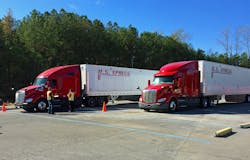Green Fleet of the Month: U.S. Xpress gains
“We take fuel economy seriously, so we’re always looking for technologies we can take advantage of today and in the future,” said Gerry Mead, Sr., vice president of maintenance at U.S. Xpress, the Chattanooga, TN-based truckload carrier. “Last fall, for example, we hosted In-Service Fuel Testing to compare the fuel efficiency of engine-drivetrain components and help validate the decisions we make about our equipment.”
Conducted by the PIT Group, the In-Service Fuel Testing on powertrain combinations took place at the carrier’s facility in Tunnel Hill, GA. Utilizing U.S. Xpress trucks configured in a variety of tractor and powertrain combinations, the testing included 2016 and 2017 vehicles from Freightliner, Peterbilt, Kenworth, and International. Detroit, Paccar, Cummins, Eaton, Allison, and Dana supplied drivetrain components.
For the evaluations, PIT Group identified a 60-mile test course on highways and local roads that represented typical U.S. Xpress operations. Loaded, in-service U.S. Xpress trailers and drivers were used for the tests, which followed TMC Fuel Consumption Test Procedure—Type III (RP 1103A). The fuel consumption of one component of a combination vehicle was compared to the same component in another combination vehicle.
“Evaluating a variety of powertrains was very valuable,” Mead stated. “It validated our decision to use only automated manual transmissions in the over 7,000 tractors in our fleet, and it’s made us a proponent of downsped powertrains because it proved we can save fuel with those specs without sacrificing torque throughout the power curve. The testing also gave us a reason to look more closely and further evaluate 6x2 axle combinations.”
About 10 eNow solar panel systems are also undergoing testing at U.S. Xpress. “With higher demand on electrical systems for driver comfort and convenience items, we need a way to keep truck batteries charged without running engines,” Mead explained. “So far, the panels have worked well using the sun’s energy and even seem effective if there’s strong ambient light in parking areas.
“At the same time, we’re also testing a few different auxiliary power sources,” Mead added. “We’re working with Bergstrom, Dometic and ParkSmart, and we’re planning to test another system soon.”
U.S. Xpress is also finding fuel savings in trailer aerodynamics, including side skirts and rear devices as well as Eco Flaps splash guards. The company currently has 1,200 Stemco TrailerTail units in service. A recent order of 1,800 new trailers from Hyundai and Wabash National has been spec’d with SmartTruck Top Kit systems that include a rear roof aerodynamic rain guard and rear corner side fairings.
Environmentally friendly maintenance practices are not overlooked at U.S. Xpress either. “Sometimes it’s simple things,” Mead said. “We’re using the EQUAL wheel balancing solution in place of steel and lead weights because it doesn’t leave waste on the side of the road if a weight comes off or generate more waste in the shop.”
U.S. Xpress is also using a nonhazardous solution to eliminate solvents in its shop parts cleaners. “We’ve adopted the SmartWasher parts washing system. It uses a water-based solution and a specialized mat impregnated with environmentally safe microbes that break down grease, oil and other contaminants,” Mead explained.
Looking to the future, last December U.S. Xpress announced it would test and be an early adopter of the zero-emissions, hydrogen-electric Class 8 Nikola One truck from Nikola Motor Co. According to Mead, the news is an example of how the company is always willing to work with manufacturers to find new opportunities to conserve energy.
“Reducing emissions and cutting the carbon footprint of our fleet means evaluating every possible technology and idea,” Mead stated.
